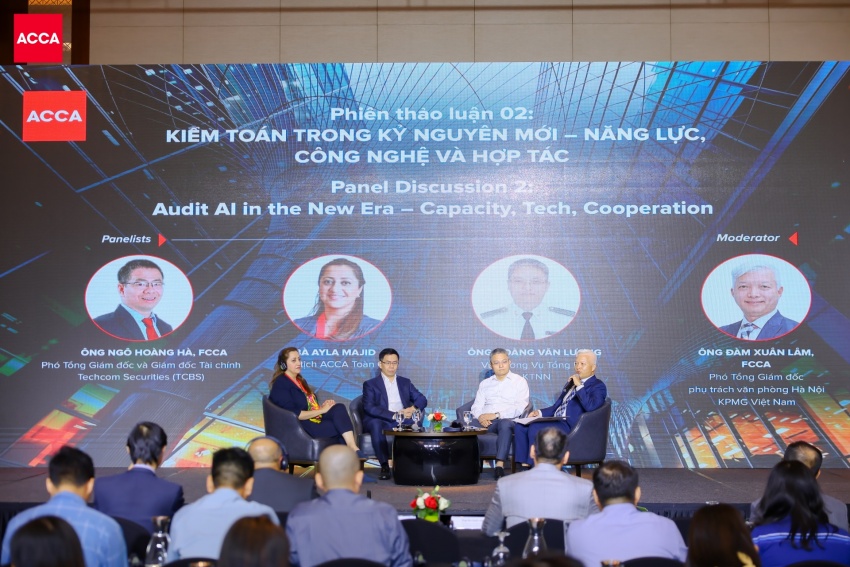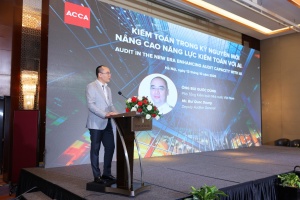INTERNATIONAL INVESTMENT
AND PORTAL
Held on October 13, the international conference on enhancing audit capacity through AI was co-organised by the State Audit Office of Vietnam and the Association of Chartered Certified Accountants. The event gathered more than 100 senior representatives from international organisations, audit institutions, and the financial and academic sectors to explore how technology can improve audit quality and strengthen governance.
A key highlight of the programme was the second panel discussion on AI’s impact on audit capacity, technology, and collaboration, which drew strong interest from experts. Opening the session, Dam Xuan Lam, partner at KPMG Vietnam, noted that in both public and financial auditing, expectations for transparency, accountability, and operational efficiency have never been higher.
“That is also why enhancing the capacity of the State Audit in particular, and auditors in general, has become critical in the era of digital transformation,” he said.
According to Lam, applying AI in auditing is not only a technological trend but also a test of human professional competence and ethics.
“AI can accelerate processing, but humans must lead, control, and ensure that technology is used for the public good, rather than replacing professional value.”
Hoang Van Luong, director of the General Department, SAV, noted that the scope of auditing work has significantly increased due to changes in administrative organisational models.
“Previously, we had three administrative levels: province, district, and commune. Now there are only two: province and commune. This has significantly increased the volume of auditing work,” he explained. “Without investment in and application of technology, especially AI and big data analytics, fulfilling our tasks is nearly impossible.”
Speaking at the event, Luong said that SAV has begun implementing certain auditing support software, particularly in banking and audits of investment projects.
“In 2024, we have introduced at least two digital technology applications to support auditing, and we are continuing to work closely with the SAV’s IT Department to expand the use of AI in audit processes,” he stated.
Luong also mentioned that AI application will help shorten data processing time, enhance monitoring of public financial activities, and enable faster and more effective identification and analysis of key matters.
“However, implementation also faces many challenges, the biggest being data-sharing issues, an incomplete legal framework, and uneven technological capacity among auditors,” he added. “We need a clear legal mechanism to ensure that data sharing between ministries and the State Audit is conducted transparently and effectively.”
According to Luong, an important direction is the amendment of the State Audit Law, expected in 2027, to clearly define the responsibility of relevant agencies to share information. He also expressed hope that SAV’s digital transformation process will be accompanied by the private sector and international organisations, particularly in sharing experience, training, and technology transfer.
“We cannot go alone. Public-private collaboration is key to enhancing audit capacity in the digital age,” said Luong.

Photo: ACCA Vietnam
Meanwhile, Ayla Majid, ACCA’s global president, returned to a core question: why does auditing exist?
According to her, the purpose of auditing is to ensure transparency, strengthen trust, and thereby support the efficient and rational allocation of capital and resources.
“In that regard, AI brings tremendous value, as it enables faster, more accurate, and more efficient data analysis, helping organisations implement solutions precisely, reduce costs, and optimise resources,” added Majid.
However, the ACCA’s global president also noted that this transformation requires continuous learning and adaptation while maintaining professional transparency principles.
“ACCA has made AI a central component in its new professional training and certification scheme, announced this June,” she said. “In addition, ACCA is strengthening cooperation with key partners globally, including the SAV, to share international experience, boost digital transformation, and work towards the common goal of developing transparent and sustainable public auditing.”
Majid stressed that although the auditing profession has undergone many changes over the decades, the human role remains indispensable.
“On the contrary, we are shifting towards more strategic and value-creating roles. Those who continuously invest in learning, skill enhancement, and responsible technology application will always retain their professional value,” she noted.
According to Majid, the key lies in strengthening collaboration and cross-learning among audit agencies, regulators, enterprises, and professional organisations. ACCA aims to act as a bridge for global knowledge sharing, helping stakeholders learn from each other as governance systems continuously evolve.
“Future professionals do not necessarily need to know programming, but more importantly, they must understand how AI and large language models can collaborate with humans, increasing flexibility while ensuring robust governance,” she concluded.
From a corporate perspective, Ngo Hoang Ha, deputy CEO of Techcom Securities, stated that AI has become a core organisational capability.
“At Techcom Securities, we have started applying AI in multiple areas, from portfolio management and risk assessment to customer behavior analysis,” said Ha. “AI tools help the system operate more efficiently, reduce manual errors, and support analysts in making faster and more accurate decisions.”
Specifically, Techcom Securities requires all employees, not just those in technology, to participate in a basic AI course to fully understand its nature and practical applications.
“The crucial factor is data. If data is not clean, AI will misrepresent reality,” he said. “Therefore, we build a standardised data system, ensuring integrity and traceability. Then, AI truly becomes a second pair of eyes for managers, helping detect risks and enhance operational efficiency.”
Nevertheless, Ha stressed that “AI is only effective when users understand its objectives and limitations. We consider AI a support tool, not a replacement for humans. All final financial decisions still rely on human intelligence, experience, and professional ethics. That is how we balance speed and accuracy, technology and trust.”
At the end of the discussion, all four experts agreed that digital transformation in auditing cannot be separated from the human element, and AI is not just a technical tool, but an opportunity to redefine transparency, efficiency, and trust across the public financial system.
 AI reshapes accounting from automation to human strategic influence
AI reshapes accounting from automation to human strategic influence
The latest report from the Association of Chartered Certified Accountants points out that accountants can thrive in an AI-dominated workplace, just as they have done in other tech revolutions.
 Businesses remain upbeat about global trade despite tariff turbulence
Businesses remain upbeat about global trade despite tariff turbulence
Global businesses continue to express confidence in trade prospects over the medium term, according to a report released by the Association of Chartered Certified Accountants (ACCA) on September 30.
 ACCA and SAV explore AI’s role in modernising public auditing
ACCA and SAV explore AI’s role in modernising public auditing
The Association of Chartered Certified Accountants and the State Audit Office of Vietnam convened a high-level forum in Hanoi to explore how AI can enhance public auditing and financial governance.



















